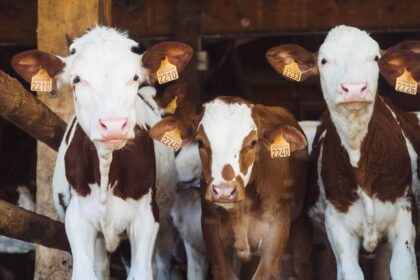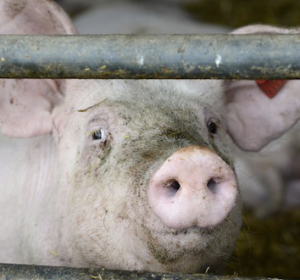Yesterday, October 28, 2021, a man tried to give me a bag of marshmallows. The employees of a local factory decided to walk around town …
Being Vegan is Emotionally Confusing or Why Marshmallows Bum Me Out


Yesterday, October 28, 2021, a man tried to give me a bag of marshmallows. The employees of a local factory decided to walk around town …

Is it possible for a question to be both simple and mind boggling? For me, the question of whether or not I am a good …

I actually think most people are already vegan at heart and it’s just a few pesky habits that need changing. What I mean is that …

Communicating with others on important topics where we disagree is challenging. Often, we avoid hot topics but, unlike religion and politics, veganism is impossible to avoid. Veganism touches every aspect of our lives and to push it to the realm of an off-limits topic is to hide who we are from the rest of the world. For me personally, this felt akin to living a half-life where I am isolated and disconnected from other human beings. Luckily, communication strategies can be taught. They are simple and, while they may not come naturally, they can be learned. In developing the Friendly Vegan approach, I draw from Counseling Psychology, the work of Marshall B. Rosenberg, PhD on Nonviolent Communication and I encourage a meditation practice. With education and practice, you can (among other things), learn to recognize your triggers, find inner and outer validation, and engage in fulfilling conversations.

Using my background as a counselor and my interest in meditation and yoga, I slowly developed a way to be vegan in the world that felt authentic and effective. When I realized I wasn’t the only vegan out there with these problems, I started a support and education group. I believe vegans need a community of supportive, like-minded people. We need a place where we can feel safe and free to vent about our frustration, anger and sadness without being judged. Having this space allows us to work through our feelings so we can later engage in a non-vegan world in a reasoned way. We help ourselves and each other to become emotionally healthy vegans.

I was inspired to think about this question by Suzanne’s experience at the Peace Fair last weekend (see her blog post). I and my fellow vegans fantasize about a day when animal agriculture will be a thing of the past. I imagine my great-grandchildren looking at pictures in history books and exclaiming, “THAT was a thing?! People used to DO that?!” It’s a nice thought and I believe that day will come (although, let’s face it, I may not actually be around to see it) but when someone asks a question at a “Conversation with a Friendly Vegan” table, I want to spend some time with it, do a little research and dig a little deeper.
The question posed to Suzanne was: What’s your plan for all the people who will lose their jobs if we stop eating animals? I’ll momentarily put aside the intention of the speaker which I think was to ask a “gotcha” question and just assume the question is sincere. The truth is, I’m not an economist or expert on market restructuring. My “thing” is to be as compassionate as I can be in my daily actions and to do what I can to build compassionate relationships with others. Given that particular mission, I guess my personal “plan” is to extend that compassion to anyone who may be temporarily harmed by the extinction of animal agriculture. When it happens, it will not be the first nor the last time the market forces industries to adapt to changes in consumer demand.
Looking to the future
If you’ve been paying attention, you’re probably aware that animal agriculture is not the only industry that will experience massive changes in workforce needs. If you believe the experts, artificial intelligence will be performing most repetitive jobs in the not-so-distant future. What’s my plan for them? Same as above. Compassion may not be able to solve all problems but, in my opinion, it’s a powerful place to start the brainstorming session that will result in positive action.
Learning from the past
It doesn’t seem like that long ago that I used to head over to Blockbuster to rent a movie every Friday night. If you’re under forty, you may not even know what I’m talking about so let me enlighten you. Whenever we wanted to watch a movie that wasn’t on one of the thirteen channels available to us, we had to get in our cars and drive to a store to rent one. We were better off going early or we’d be stuck with a clunker of a movie because all the good ones would be gone. Then, if we returned it late or failed to rewind, we’d pay fees. Oh wait, you don’t know what I mean by “rewind”, do you? Look up “VHS” and figure it out, young one. My point is that there are many jobs and entire industries that no longer exist. Why? In Blockbuster’s case, it was due to technological progress. When the CAFOs are gone, it will be largely due to compassionate progress. We are an innovative species with a lot of grit and we will figure it out.
What do you think? Any economist vegans out there that can shed some light?

Conversations with a Friendly Vegan (CWAFV) is a multidisciplinary approach to advocacy that draws from counseling, philosophy and mindfulness. I developed this approach in response to social difficulties I encountered when conversing about veganism in my largely non-vegan community. In this post, I’ll briefly review a bit of background on how and why I created the CWAFV approach, define CWAFV, discuss what it isn’t, and review the basics of the method that asks that you:
1.reflect on vegan issues,
2.practice mindfulness and apply it in conversations,
3.engage empathy,
4.practice active listening skills,
5.use tactful questioning, and
6.express your point of view.
When I first became vegan in 2012, it seemed natural and unavoidable to me to inform my friends and family. I was happy and excited about my decision because it represented a personal evolution toward greater authenticity. I was caught off guard by the sense that my veganism was off-putting. I didn’t understand and, in the absence of that understanding, I proceeded to respond emotionally and reflexively which meant either lashing out or shutting down. Either way, I was very effective at ending conversations about veganism. While I was doing this, I was devouring information, mainly so I could win arguments. It felt terrible to be rendered silent when someone challenged me so I armed myself with information so I could feel better and, for a few moments after “winning” an argument, I did actually feel better. For those glorious moments, I could bask in the glow of my rightness. I could revel in my well-thought-out (and emotionally thoughtless) retort. When that glorious moment passed, I ultimately felt just as unsatisfied and depleted as when I lashed out or shut down. Why did it feel so wrong? I realized that I had just found a new and improved way to end a conversation about veganism. While being vegan felt deeply right, most of my conversations about it felt wrong. I set out to understand why this was the case and how I could better express myself so that the intended, positive message was not lost in a clumsy delivery because (and this is important), if we can’t even talk about it, how will anything change? Perhaps now more than ever, we need a healthy way to talk about non-neutral topics such as veganism.
I became vegan because I decided to place a priority on compassion, kindness and non-violence. While these are values I claimed long before going vegan, I acknowledge that I was not previously living in accordance with them and I am still learning and evolving to course correct when I find a gap between what I say is important and how I behave. Being vegan is a manifestation of these values. In this sense, the CWAFV approach also represents an outward expression of these deeply held values. With this approach, the goal is to place a compassionate connection at the forefront of advocacy. It can be applied in an official advocate capacity or amongst family and friends.
The primary goal in a friendly vegan conversation is, paradoxically, NOT to change someone’s mind or persuade them to veganism. It’s not to win an argument or prove how much you know about where protein and calcium come from. It’s not to show people the error of their ways. It’s simply to keep the dialogue about veganism open and productive and to allow the space to examine what was previously unexamined by placing emphasis on deep, human connection. Why? Why not just dive in with well-thought out arguments?
The underlying premise of the CWAFV approach is that connection is the key to positive change while persuasion generally keeps us mired in defensiveness. A well-reasoned argument is not necessarily a compelling argument. You may be right (or not) but just being right misses the point. This isn’t to say that I do not eventually share thoughts and ideas that may contradict the speaker. It’s a conversation, after all, which means all involved get to contribute. But my contribution would fall flat if I didn’t first take the time to connect with the other person and truly understand what he/she is saying. I want to know what is important to him/her. I want to know what he/she is trying to tell me about him or herself. Typically, it only takes a few minutes and a bit of inquiry for a clearer picture to emerge.
EXPLORE THE ISSUES
Becoming vegan is not a simple task. It’s a complex transformation that presents a myriad of questions and ideologies ranging from the simpler nutritional requirements to the layered issue of your opinion of abortion. There are few things more frustrating than having a point of view but being unable to articulate it. I encourage you to learn about and reflect on the issues, not to arm yourself with a defense to help you “win” arguments but to help you evolve and settle into your veganism in a way that is uniquely you. Keep a journal and begin or deepen a mindfulness practice. You will no doubt, as I did, learn much about yourself.
CWAFV is not a prescriptive approach in that there are no set responses I can offer you. Your responses will depend on how you see the issues and the circumstances of the conversation, including your relationship with the other person. CWAFV offers a way to connect with others that is authentic and meaningful so that we can move beyond defensiveness and continue exploring difficult, potentially triggering topics such as veganism. Detach from any outcome and just focus on engaging in the conversation. This requires that you invest in doing deep, reflective work and that you learn a set of skills to assist you during conversations.
LEARN AND PRACTICE THE SKILLS
The conversational skills inherent in this approach are: mindfulness, active listening, empathy, tactful questioning and thoughtful expression. I’ll briefly describe each skill below and offer you resources for further study.
Mindfulness is the state of active awareness in the present moment and is closely related to the second skill of active listening. During important conversations, particularly when you disagree, you may find your mind jumping to your response before the other person has fully expressed his/her thoughts. Your passion for veganism and wanting to share what you know no doubt comes from a good place but it will interfere with ongoing, productive conversations if you jump in too early. Remember to detach from the outcome. Free yourself from any agenda and simply listen. Let your ears take over while your voice takes a break and allow the other person’s words to enter your consciousness free of judgment. Your time to speak will come later but begin by seeking to understand. Presence and active listening skills are rare gifts that will likely be appreciated. They have the power to create and build a bond that can set the tone for meaningful, connected conversations.
When the other person has expressed him/herself, there is no need to immediately begin speaking. A moment of silence can help you to process what you’ve heard. You may say something like, “Thank you for sharing your perspective. I’d like to take a second to let it sink in so I’m sure I understand.” In that moment of silence, check in with yourself. Did it trigger anything for you? What do you feel and where do you feel it? Do you have any questions for the speaker? Where is there common ground?
Empathy is engaged when you allow yourself to understand or feel what another person is experiencing. When we understand, it does not mean that we agree. While you may disagree with the speaker, can you access your empathy to see where he/she is coming from? Even if you don’t believe what the speaker believes, can you sense how he/she came to believe it?
As you listen to the speaker, mindfully and with empathy engaged, questions may arise. At this point, you will hopefully sense a bond or rapport between you and the speaker. This happens when the speaker feels well and fully heard and understood. To adequately convey that you have heard and understood, you can check in by paraphrasing what you heard and asking if you got it right. At this point, you can express your point of view in an atmosphere of mutual respect. If you bristle at the word “respect”, keep in mind that I am making a distinction between respecting a person and an opinion. You can feel deeply connected to and respectful of another person and entirely disagree with his/her opinion.
FIND ONGOING SUPPORT
Frustration, confusion, anger, sadness, loneliness – these are all natural to feel for anyone but, in particular, when you are vegan in a predominantly non-vegan culture. It’s important to be kind and patient with yourself and to seek the company of like-minded people on a regular basis. Acknowledge what you feel and take measures to provide soothing comfort as you likely would if a friend were feeling distressed. A vegan support group is a good place to find information, support and, sometimes, good vegan food. It’s also a good place to vent about frustrating conversations. This allows you to process your thoughts and feelings, gain the wisdom of the group, and learn what might support a more productive conversation in the future. Conversations don’t always go well but, in my experience, the conversations keep coming so there’s always another opportunity to practice CWAFV skills.
FOR FURTHER STUDY
Contact me at anne@conversationswithafriendlyvegan.com for information on our advocacy training.
BOOKS
Mind if I Order the Cheeseburger?: And Other Questions People Ask Vegans by Sherry F. Colb covers a variety of issues and can help get you thinking.
Wherever you go, There you are: Mindfulness Meditation in Everyday Life by Jon Kabat-Zinn
A Way of Being by Carl R. Rogers
PODCASTS
Food for Thought by Colleen Patrick Goudreau
Main Street Vegan
Bearded Vegans
DOCUMENTARIES
Cowspiracy
Peaceable Kingdom
What the Health
Forks over Knives
If a Tree Falls